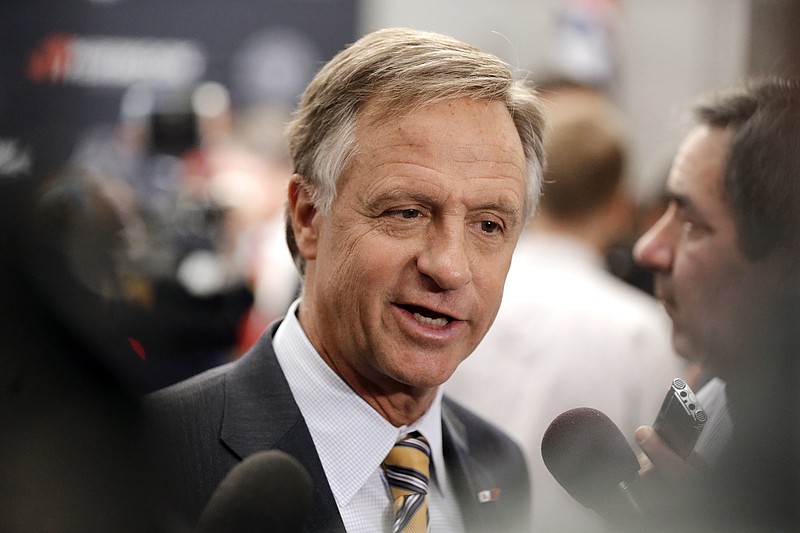NASHVILLE - The Holy Bible will have to survive on its own merits after an effort to override Republican Gov. Bill Haslam's veto of a bill making the text the official book of Tennessee government failed Wednesday in the Tennessee House.
Efforts by Rep. Jerry Sexton, R-Bean Station, the bill's sponsor and a former Baptist minister, to override Haslam's veto received only 43 of the required 50 votes needed to overturn the governor's action.
Fifty representatives - a majority in the 99-member chamber - voted to sustain the governor's veto. Four others abstained.
The lengthy fight over the bill consumed nearly two hours of lawmakers' time as they furiously worked to adjourn their annual session on Wednesday. Unlike any number of bills here, proponents and opponents were well versed on this measure, citing various Bible passages as the representatives sought to support differing positions.
Haslam last week vetoed the bill, citing constitutional concerns and warnings that it "trivializes" what he personally believes is a "sacred text" by placing it among state symbols such as a .50-caliber sniper rifle, the box turtle and the honey bee.
Other symbols of Tennessee listed in its official Blue Book include "Rocky Top," a moonshine-themed tune that strongly hints at the murder of revenue agents who come into the mountains seeking illegal liquor stills.
Sexton's bill cites the justification for adding the Bible to the list as its historical and cultural role in Tennessee history.
As he began the debate, Sexton told colleagues, "I'm not here at the will of anyone except for those who voted for me as their representative." He noted he told his constituents he would "vote on a moral stance and then I would represent them."
"We have an obligation today and it's not about the establishment; it's not about the party. It's about the 65,000 people who sent me here," Sexton said. And he warned that "you won't be remembered for why you voted the way you voted, you'll be remembered for how you voted."
He later argued making the Bible the state book was "symbolic."
Rep. Johnny Shaw, D-Bolivar, a minister who voted for the bill last year, said he had had a change of heart because of Haslam's constitutional and personally held religious views cited in his veto message.
Making the Bible the official book of Tennessee won't change what anyone thinks, Shaw said.
"If it's not in your heart we are not doing anything but mocking God," Shaw said, later noting, "it's one thing to talk about love, but it's another thing to put it in progress. If you really want to honor the Bible, we ought to make sure everyone in this state is covered healthwise."
But Rep. Terri Lynn Weaver, R-Lancaster, a Christian music artist, said having the Bible as Tennessee's official book could serve as a beacon of light to the entire nation that is adrift.
"What if we are the state that fans the flame and causes other states to pay attention and read our actions," she told colleagues. "What if Tennessee was the state that started the revival that this nation too desperately needs?"
Rep. Antonio Parkinson, D-Memphis, who opposed the bill, cited the Gospel of Matthew: "When you pray, do not be like the hypocrites who 'love to be seen by others.'"
The bill passed the House last year with 55 votes and the 33-member Senate recently with 19 votes - just over the constitutionally required 17 votes.
Tennessee Attorney General Herbert Slatery had issued a legal opinion saying the bill violated both the U.S. Constitution and Tennessee Constitution, which has even firmer admonitions about the separation of church and state than the federal document.
The state Constitution says "no preference shall ever be given by law, to any religious establishment or mode of worship."
That prompted some debate as well.
The state constitution also bans "ministers of the Gospel" such as Sexton, Shaw and several other lawmakers from even serving in the General Assembly. But that provision was overruled by the U.S. Supreme Court in a 1970s case involving the Rev. Paul McDaniel of Chattanooga, who wanted to serve in a Tennessee Constitutional convention where delegates ran along legislative lines.
The Associated Press later quoted Haslam as saying he was grateful to the GOP-run House for upholding his veto.
"I felt like it trivialized the Bible to put it on the same level with the state bird and insect and so many other things we have," the governor said.
Moreover, he noted, "the Bible is either the inspired Word of God or it's not. We shouldn't honor it for one reason when it's really for another."
The Senate ultimately decided it would not be able to complete its business and opted to adjourn until this morning. The House, after spending the better part of nine hours on the floor, decided to labor on and appeared likely to finish Wednesday evening.
Contact Andy Sher at asher@timesfreepress.com, 615-255-0550 or follow via twitter at AndySher1.
